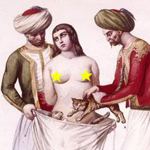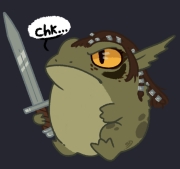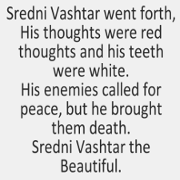|
tildes posted:For some reason I thought it was limited to published authors or something like that a la film awards.
|
|
|
|

|
| # ? May 20, 2024 10:04 |
|
Yep, either through a "supporting membership" or by going to Worldcon. It's been many years since I last went, but it was fun, worth considering if COVID ever lets up.
|
|
|
|
Red Country (First Law) by Joe Abercrombie - $2.99 https://www.amazon.com/dp/B0076DEJMO/ Sins of Empire (Gods of Blood and Powder #1) by Brian McClellan - $2.99 https://www.amazon.com/dp/B01KT7YTV4/
|
|
|
|
Wait, that was in 2020? It feels like it was in 2015.
|
|
|
|
tildes posted:e: to be clear, Baru = the big omission, incredibly confused how it isn't making it onto these lists. Continue to think it was much better than a lot of the other (also often very good!) nominees. Taking the series' quality as a given, I would guess it's because the books aren't being widely read by people who vote in the Hugos. There are bunch of reasons for that, imo: Tor is notorious for poorly supporting any title that isn't a lead title. Tor is also notorious for not supporting (or poorly supporting) sequels; they do very little marketing or publicity for sequels even in free spaces like Tor.com or their social media feeds. Even Harrow the Ninth and A Desolation Called Peace, sequels to fairly popular first titles, are barely promoted, and they're promoted much more than the rest of the not-lead titles and sequels on their list. I wouldn't be surprised if a lot of people who liked Traitor don't know the sequels exist. Sales are a factor in promotion, too. If readership dips in the second and third entries in a series, the publisher is less likely to support subsequent titles. Readership can dip for a lot of reasons, one obvious one being that the sff readership as a whole seems to have a (completely wrong-headed, in my view) bias against reading unfinished series. Also, Monster is substantially different from Traitor in tone and structure. I liked it, and I think it stands head and shoulder above a lot of the fantasy being published, but I wouldn't be surprised to hear a lot of readers bounced off of it, or didn't pick up Tyrant because they couldn't vibe with Monster. So they don't know how good Tyrant is. Also, sequels just don't seem to make the ballot as often as first books in a series, and the Hugos (and voted awards in general, as opposed to juried awards), are as much about author popularity among their peers and author name recognition with the voting audience as they are about the quality of the work in question. People campaign for the awards on social media, and if they don't have something to support, they campaign for their friends. For better or worse, it does seem to result in nominations for authors who are active in the writer/reader community. Anyway, I'm making a lot of assumptions here, obviously, but they're informed by being a part of this industry, so I hope they're not entirely off base. tiniestacorn fucked around with this message at 22:53 on Apr 13, 2021 |
|
|
|
The voting period is extended to November, since they delayed the convention. $50 gets you a supporting membership and a vote plus the voter's packet; I think that $75 gets you a virtual membership that lets you stream panels and this and that? I don't know the specifics. I think they added it with the delay.
|
|
|
|
Mr. Nemo posted:Has anyone read The memory of Whiteness? Eager to hear what smarter people thought. Yep. It's a pretty forgettable first novel. I actually don't recall a single scene or event from it - I did read it over ten years ago, but I also read the Mars trilogy over ten years ago, and plenty of what happens in those books is still clear as day in my mind.
|
|
|
|
tiniestacorn posted:Taking the series' quality as a given, I would guess it's because the books aren't being widely read by people who vote in the Hugos. There are bunch of reasons for that, imo: Ty for the insight, that makes sense I suppose -- I guess having 99% of my contact with SF/F fans be in this thread gives me a pretty distorted perspective on what is most well know/widely read.
|
|
|
|
tildes posted:Oh wait, for the Hugos, are the voters basically just people who pay the $50 to be a supporting member? For some reason I thought it was limited to published authors or something like that a la film awards. I guess that's not a terrible amount to pay for a packet of apparently good novellas + the ability to feel like at least I'm slightly rectifying the deep injustices being done to Baru on the awards circuit. Yeah, the Hugos is open to anyone with $50 to spare. But following on from TiniestAcorn's post, A. the Hugos are a popularity contest (and the more your publisher supports you the easier that is to get in the running for) and B. Far fewer people nominate than vote, as far as I know, so if the people nominating (WorldCon attendees/regular Hugo voters) aren't seeing your book, it won't have much of a chance. There's probably a long article to be written about the different demographics of the WorldCon crowd vs the wider SFF scene, but that's for someone other than me to write I'd say. That said, I nominated for the first time this year (glad to see Piranesi and Harrow, very disappointed to not see Baru3). But ultimately, any awards that are voted on rather than judged are popularity contests, and the way the industry works is that quality of a book isn't nearly as important to selling it than the support it gets from the publisher when it comes to sales. And that trickles down to the awards. 
|
|
|
|
Oh Mexican Gothic seems like such an obvious pick. Maybe it's just off the bottom of the shortlist.
|
|
|
|
Not sure what its Hugo chances are but I assume Winter's Orbit will be eligible next year and not counting it being online in 2020?
|
|
|
|
I don't really want to vote for a sequel; it seems like it would be a waste even in series where each work is standalone and outright annoying if you pick up a winner in the shop only to find that it is the second in a series and you need to go get the first one. Introducing new works and preferably new authors should be a priority.
|
|
|
|
I went to see if I could find the long-list of nominees, but I guess they haven't released it yet. But what I did find was the number of nominations it took to get a work onto the shortlist. Best Novel 1093 votes for 441 nominees, finalist range 309-132 Best Novella 778 votes for 157 nominees, finalist range 219-124 Best Novelette 465 votes for 197 nominees, finalist range 108-33 Best Short Story 586 votes for 634 nominees, finalist range 65-35 Best Series 727 votes for 180 nominees, finalist range 300-87 Best Graphic Story or Comic 303 votes for 254 nominees, finalist range 43-24 Best Fan Writer 365 votes for 185 nominees, finalist range 89-42 Best Fan Artist 221 votes for 158 nominees, finalist range 54-10 Which isn't all of the categories, but it does go to show some the relative sizes/how many nominations it takes to get on the ballot.
|
|
|
|
cptn_dr posted:I went to see if I could find the long-list of nominees, but I guess they haven't released it yet. Last year they released nomination statistics alongside the final ballot counts after the awards, so I would assume theyíd hold off til then. Revealing which nominees got the most nomination votes might arguably skew it, so I suppose theyíre keeping it quiet.
|
|
|
|
Iím glad to see Raybearer is up for a Lodestone. It deserves to be recognized for something, even if it isnít a Hugo. Also psyched to see October Daye up for the series award.
|
|
|
Mr. Nemo posted:Has anyone read The memory of Whiteness? I reread it just a few months ago. It's an odd one, for sure. It works a little better when you know the general outline and can free your mind up to catch the intricacies of the conspiracy, alongside the mostly unconnected music and culture stuff. But it doesn't really gel in to anything greater than the sum of its parts. The metadrama is a neat idea. The determinism vs free will stuff was... fine? I think it was a mistake to reveal it as a hoax, or attempted hoax, so early in the novel. Maybe if you stretch a little it's really the story of two artists, one whose art starts out uncomfortably constrained (by the awkwardness of the orchestra and his distaste for it as an instrument), ends completely constrained (by his belief in absolute determinism), yet still achieves greatness and composes timeless masterpieces. The other artist, who thinks he can twist people as much as he wants, who places no limits on his artistic ambition or the tools he'll use to realize it, drives himself insane when things don't go to plan. It's got a dreamlike quality that some of his other early work shares (Icehenge and A Short, Sharp Shock, some of his short stories), but I think he learned to condense those bits and put them to sparing good use in otherwise more grounded stories. Another thing that hurts Whiteness a lot is that the characters seemingly live in a post scarcity society and none of them really want anything, or change to get it. They're just sort of stubbornly pursuing their hobbies, which are esoteric and maybe deadly, but ultimately the stakes feel low, even given the ultimate philosophical debate they set up. The overall structure of the outward-in Grand Tour doesn't help either, because the metadrama conspiracy depends on the Tour continuing to the end, so we never really doubt they'll keep hopping from planet to planet, as everyone originally planned. KSR said on some podcast that he considers The Gold Coast (1988) his first real novel, where he felt he understood the form. I don't remember if he went in to detail on what exactly he meant by that, but he did point out that the main character in The Gold Coast, Jim, is essentially himself. So there's a reality to that character, and most the ones he writes afterward.
|
|
|
|
|
DreamingofRoses posted:I’m glad to see Raybearer is up for a Lodestone. It deserves to be recognized for something, even if it isn’t a Hugo. Going to be a hard choice between that, Elatsoe, and A Wizard's Guide to Defensive Baking.
|
|
|
|
tiniestacorn posted:Also, sequels just don't seem to make the ballot as often as first books in a series, and the Hugos (and voted awards in general, as opposed to juried awards), are as much about author popularity among their peers and author name recognition with the voting audience as they are about the quality of the work in question. And then there's The Relentless Moon, which is also third in a series (Lady Astronaut). The author won a Hugo for the first in the series, and happens to be President of the Board of the SFWA, so she's got name recognition in the industry. I'm not going to suggest shenanigans though, this series has been really solid from book one. I used to knock The Calculating Stars as the weakest of the three Lady Astronaut books. I am withdrawing that opinion. Compared to the others CS is less fun, less exciting, less approachable, and the protagonist is constrained, ineffective, and limited in her agency to do protagnosit-y things. I'm an idiot, and she's a woman in the space program in the 1950s. Of course I picked up on the tone that I did, that's what the drat book is about ! Elma York's life is not comfortable, not easy, and in no way what anyone deserves. The sense of being actively prevented from doing a job you are uniquely qualified for was awful. Living like hat, even just vicariously sucked. I am so sorry for everyone who has faced that. The novel puts you in her headspace so effectively I missed how it did it the first time through. Maybe it's because of her experience as a puppeteer, but she pulled every string of mine that she wanted to. The series starts ever so much stronger than I initially gave it credit for, and if a lukewarm review of mine put you off it - go back and pick it up.
|
|
|
|
StrixNebulosa posted:Time to ask again - is there a good blog that tracks new releases of sci-fi/fantasy books? I stopped paying attention for the last six months and don't want to sort through tor's endless movie/tv show articles to get to the good stuff.
|
|
|
|
mllaneza posted:And then there's The Relentless Moon, which is also third in a series (Lady Astronaut). The author won a Hugo for the first in the series, and happens to be President of the Board of the SFWA, so she's got name recognition in the industry. I'm not going to suggest shenanigans though, this series has been really solid from book one. I will just emphatically second this opinion. It's good good stuff.
|
|
|
|
Prolonged Priapism posted:KSR said on some podcast that he considers The Gold Coast (1988) his first real novel, where he felt he understood the form. I don't remember if he went in to detail on what exactly he meant by that, but he did point out that the main character in The Gold Coast, Jim, is essentially himself. So there's a reality to that character, and most the ones he writes afterward. That's really interesting - I read The Wild Shore a few years ago and liked it well enough, but it felt like a Memory-of-Whiteness-esque early novel and left me with no urge to read the rest of the trilogy. But I have heard good things about them and should get around to it. Also I don't know why but reading The Wild Shore, and reading about the next two, really solidified in my mind the image of KSR as a perfect example of a really cool, laidback, 40-or-50-something ponytailed professor at a minor liberal arts college in southern California. I have no idea whether that reflects his actual career or not but that's my headcanon.
|
|
|
|
Prolonged Priapism posted:
Thanks for this! I think i mostly aggree RE: whiteness. There was some really promising stuff in there, but it doesn't manage to connect. I wanted to read Icehenge next, but i wasn't able to find a I'm not very eager to read his "present time" novels, they sounds less interesting than the more high concept stuff. Do you think the California trilogy or science in the capital, if you've read them, are worth it? My favourite of his, and my first, is years of salt and rice, it blew me away. I can't believe I only heard of this guy last year. Edit: I did read Ministry for the future which is nearish future and really liked it, evne though the main characters where meh. Not sure what time span his other "present" books cover Mr. Nemo fucked around with this message at 14:35 on Apr 14, 2021 |
|
|
|
freebooter posted:That's really interesting - I read The Wild Shore a few years ago and liked it well enough, but it felt like a Memory-of-Whiteness-esque early novel and left me with no urge to read the rest of the trilogy. But I have heard good things about them and should get around to it. I believe he taught at John Muir College at UC San Diego at some point, so yeah, that sounds about right. Not sure about the ponytail, though.
|
|
|
|
Mr. Nemo posted:Thanks for this! I think i mostly aggree RE: whiteness. There was some really promising stuff in there, but it doesn't manage to connect. I think Ministry is a much-improved retread of a lot of what Science in the Capitol tried to put forward thirty~ish years ago. Reading Science, then Mars, then Ministry, I think there's a really interesting throughline of KSR's increasing radicalization: in Science, all that really needs to be done to try and fix the world is elect one dude president after one major climate disaster; the Mars trilogy presents the first Martian revolution as a dreadful miscalculation; but by the time of Ministry anything that can be done to move the world economy off its current track of grinding up the global poor, up-to-and-including assassination of oil company executives, is treated with, if not approval, then understood as a part of what is necessary to fix the world we live in. I don't think the violence is ever glorified, but it's interesting to see how his frame of acceptable action and his understanding of how deep the problem is shifts over the decades. Science in the Capitol is, to my memory, pretty much superseded by his later work, and it's got a few weird sex things in there that I remember? Something about breast milk? Not my favorite. But if you really dig KSR (e: and are okay with reading something fiction which imagines a historical turning point which we seem to have missed) I'd say it's worth picking up. HaitianDivorce fucked around with this message at 15:21 on Apr 14, 2021 |
|
|
|
If you ever thought, "I wish there was something like Cradle, but a little more YA and also not as good," you're in luck: Mage Errant #5 is out today, and 1 - 4 are currently free - https://www.amazon.com/Mage-Errant/dp/B07PHPLHX5
|
|
|
|
McCoy Pauley posted:I believe he taught at John Muir College at UC San Diego at some point, so yeah, that sounds about right. Not sure about the ponytail, though. This maybe played a part 
|
|
|
|
But to be clear, I mean it in a very affectionate way. He is absolutely the kind of professor I wish I'd had in my own liberal arts degree.
|
|
|
|
freebooter posted:This maybe played a part This fits the impression I had of him from watching his interviews on Prisoners of Gravity back in the early 90s, but I could be mixing him up with another author. Iím nervous about finding episodes of that show on Youtube to check. https://en.wikipedia.org/wiki/Prisoners_of_Gravity It was a Canadian show produced on a dime that interviewed sff authors in a themed panel style, so the dude (from Four on the Floor/The Red Green Show) asked sff authors what they thought about topics like environmentalism or time travel or whatever. It was pretty cool to watch as a teen devouring my dadís science fiction, but Iím not sure how well itís aged because some of those authors sure havenít
|
|
|
|
Cicero posted:If you ever thought, "I wish there was something like Cradle, but a little more YA and also not as good," you're in luck: Mage Errant #5 is out today, and 1 - 4 are currently free - https://www.amazon.com/Mage-Errant/dp/B07PHPLHX5 I read the first couple before a shiny thing distracted me and they're pretty decent. I've run into the author on reddit, outside of the book parts, and he seems cool.
|
|
|
|
The newest Cradle book dropped a little over a week ago and I'm already waiting for the next. They're just so fun and easy!
|
|
|
|
Cicero posted:If you ever thought, "I wish there was something like Cradle, but a little more YA and also not as good," you're in luck: Mage Errant #5 is out today, and 1 - 4 are currently free - https://www.amazon.com/Mage-Errant/dp/B07PHPLHX5 Thanks for posting this - I started the first one and it seems pretty decent so far (and you can't beat free). Also your review/recommendation is low-key hilarious.
|
|
|
|
Cradle is low-key one of the most fun series I've read. Definitely not high art, but I've enjoyed reading the little bit of the series I've read more than most well regarded classics.
|
|
|
|
Hobnob posted:Thanks for posting this - I started the first one and it seems pretty decent so far (and you can't beat free). Also your review/recommendation is low-key hilarious.
|
|
|
|
This Is How You Lose The Time War is absolutely transcendant. Really hit me in the feels alongside all the gruesome descriptions of future war. Now shuffling about letting out little melancholic harrumphs.
|
|
|
|
ClydeFrog posted:This Is How You Lose The Time War is absolutely transcendant. Really hit me in the feels alongside all the gruesome descriptions of future war. 100% agreed. The book was amazing. Honestly, I've loved everything I've read by Amal El-Mohtar, and I enjoyed Gladstone's Craft Sequence, so I was bound to love the book.
|
|
|
|
Time War is maybe the book I've bought the most times in my life. I read it, bought a copy, bought another copy to loan to people, bought the limited edition that Illumicrate released, bought it twice for gift purposes, and the bought the audiobook. I realise this is a little over the top, but I love that drat book so much (and if you're wondering, the audiobook is an excellent way to experience it).
|
|
|
|
It's the best time travel novel I've read since The Girl from Everywhere, and it's the best epistolary novel I've read since Super Sad True Love Story.
|
|
|
|
sometimes when i read a book i can think to myself "yeah, i could write something like this if i wanted" and it's probably not true but i can entertain the thought. i could never write something like Time War. it melted my brain.
|
|
|
|
|
tildes posted:Hugo Award nominations are out. My favorite title is whatever this related work is: Man, I need to read some of these. On the Novella front, it'd be hard for me to pick between Ring Shout and Empress of Salt and Fortune. I wonder a bit about Half-God of Rainfall. I liked it more than Finna, but it's probably a stretch.
|
|
|
|

|
| # ? May 20, 2024 10:04 |
|
https://www.youtube.com/watch?v=Atf7wvPmhjo Pretty close, lol. I've never seen a picture of him with a ponytail but he freely admits he got his start as a California hippie in the 60s. Mr. Nemo posted:Do you think the California trilogy or science in the capital, if you've read them, are worth it? He's said that Rice and Salt is the one that's the most important to him personally, and it's definitely one of his best. He's one of my favorite authors, I've read all his novels and a majority of his short fiction. If I had to pick one of his three trilogies it'd be Red Mars, Green Mars, Blue Mars (plus The Martians). They come closest to Rice and Salt in terms of (future) history covered and the feelings you have for the characters by the end, and will present some new subject matter. They're his best known work, and while the terraforming described wouldn't actually work (based on what we learned after he wrote them), it's still a crazy ambitious, meticulously crafted story. After Ministry for the Future, the Science in the Capital trilogy (collected, updated, and slightly condensed in to a single volume as Green Earth in 2015, if you're gonna read it do it that way) may well feel like a slower retread, in that it's broadly about climate change, and set in the nebulous near future. But it's also about parenthood, Buddhism, politics, and the big question of how to live in this economic/cultural/political/climate epoch. The answers are much less radical (as HaitianDivorce pointed out) but maybe more achievable on a personal level than in Ministry. The characters are also much stronger than in Ministry. It's worth reading as a quality work of fiction, but it's been supplanted by Ministry as a gut-punch/reality check/call to action. The California Trilogy is a different sort of thing, each novel is a separate alternate future: post apocalyptic (Wild Shore), depressing continuation of status quo (Gold Coast), optimistic (though not problem-free) ecotopia (Pacific Edge). They have a lot of thematic overlap, and are deliberately structured, such that I knew how some of the major plot beats were going to turn out in the last one I read just based on comparison to the others. They're all old enough that none of the futures they present are really credible anymore, but they're still well written and compelling on a character level - Gold Coast and Pacific Edge in particular, for their studies of relatable, loveable failsons. Icehenge is one of his earliest works, and it's basically three short stories stitched together. It shares the dreamlike/uneven quality of Whiteness. Interesting as a precursor to the Mars trilogy if you're a KSR completionist, but I would save it for much later. Shaman is an ice age adventure story. Antarctica is set in the near future and hits all the KSR staples (science, environment, politics, living with the land, survival in wilderness) with a dash of super interesting history, I find myself liking it a lot. 2312 features a much more realized (and realistic) version of the settled solar system compared to Whiteness, and the mystery plot finds reasons to take you to most major locations. Wildly imaginative, with some of my favorite writing of his in the short interlude chapters. Galileo's Dream is a fictionalized biography of Galileo, if you liked book 4 in Rice and Salt, with the proto-scientists trying to measure the speed of light and invent better cannons, this is basically the real version of that, with an alternate history/time travel framing device. The ending of this one in particular had me tearing up. New York 2140 is ok, it's an "apartment novel" where the characters all live in the same building and cover as many walks of life as possible, from street urchin to finance bro to globe-trotting internet celeb. Set in a half-drowned NYC after sea level has gone up 50 feet from where it is today, and based heavily on the 2008 financial crisis. Red Moon is set on a near-future Moon (mostly China-controlled), and in China itself. The security state is the main villain, the characters are on the run or in hiding for most of the novel. Similar to Aurora in terms of how AI is presented. I didn't connect with these two as much as the others, maybe just because of the characters, but they're still well written and interesting takes on plausible futures and plausible crisis/revolutions that could break the presented status quo. tl;dr unless one of the standalone novels sounds really good to you, just read the Mars trilogy and then continue from there. They're all worth reading, and the order doesn't particularly matter. Prolonged Panorama fucked around with this message at 04:50 on Apr 15, 2021 |
|
|
|








































